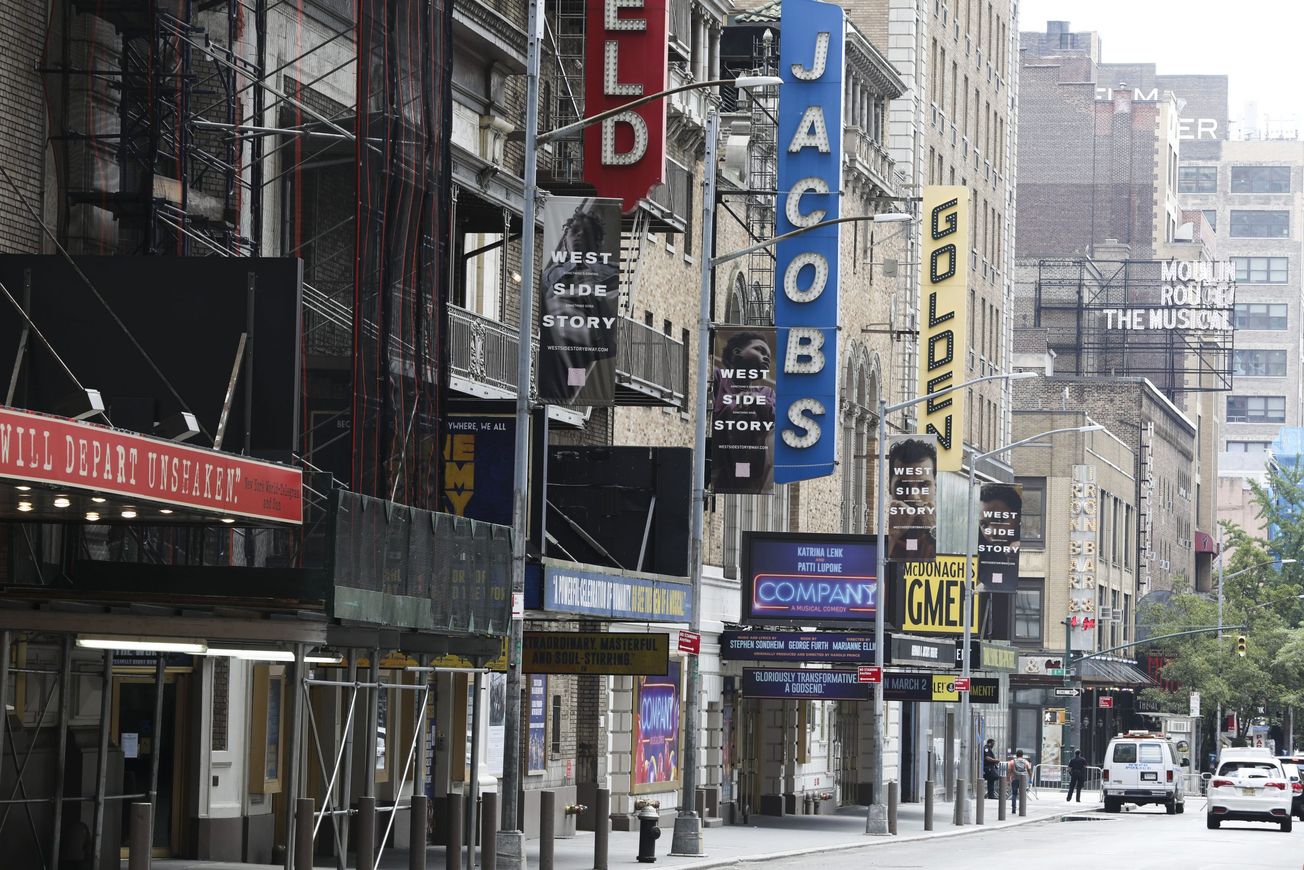The Broadway industry is relying on the passage of additional federal relief packages to sustain its workforce.
With a July 31 deadline for extending the additional $600 in unemployment benefits, theatrical unions are ramping up their lobbying efforts to ensure their members can afford basic living and healthcare expenses while theaters remain dark. Though philanthropic organizations such as the Actors Fund have raised millions to support the community, industry members say only congressional relief can meet the current need.
“Without that $600, I don’t know what August will look like, and I don’t know where we’ll be by October,” said Laura Penn, executive director of the Stage Directors and Choreographers Society. “That feels like a cliff that we have to not go over.”
After Broadway theaters closed on March 12, employees of Broadway shows received about three weeks of salary, as well as health insurance and retirement contributions. Those contributions have not been renewed — though “Hamilton” continues to contribute to health insurance for its cast, stagehands and musicians — and thousands of actors, musicians, directors, stagehands and more have relied on unemployment assistance from the federal government ever since.
Since March, that assistance has included an extra $600 a week on top of traditional unemployment benefits, but that provision is set to expire on July 31. In May, the House of Representatives passed the HEROES Act, which includes an extension of the $600 a week, but that bill has faced pushback from the Republican-controlled Senate. The Senate returns July 20 to begin drafting legislation.
With Broadway theaters officially closed through Jan. 3, and many productions setting spring opening dates, the continuation of the weekly $600 is seen as crucial support for industry members. Theatrical unions have singled out the benefit as a top priority and have been lobbying individually and collectively, as well as with the Department for Professional Employees, for its passage. Industry members have also joined the charge.
“The extra $600 per week has really been helping me not have to TOTALLY drain my entire life savings to pay for food, mortgage, health premiums, gas, utilities, laundry – the basics!”, Local 802 member Dan Micciche wrote in a public testimonial.
Still, the timing of the Senate’s return and Republicans’ voiced opposition to the extension of Federal Pandemic Unemployment Compensation has laid out a “bumpy road” for passage of the measure, said Brandon Lorenz, communications director at Actors’ Equity. Even if passed, it may take several weeks before a bill can be agreed upon, causing a lapse in full benefit payments.
When asked what would happen if the additional payment is not included in the upcoming stimulus package, union leaders struggled to envision that future.
“We’re going to continue to make the case as aggressively as possible to any member of Congress who will listen,” Lorenz said.
Industry members’ health insurance coverage is also a top concern. The union health plans largely rely on employer contributions for funding, which has dried up as members are unable to work.
“Within the year we’re going to have a problem, and it’s only going to compound after that,” said Adam Krauthamer, president of Local 802 of the American Federation of Musicians.
To address this, Broadway unions have been lobbying for a 100% COBRA subsidy, which would cover premium payments for workers who lose their health coverage. The subsidy was included in the House’s HEROES Act, but its fate remains uncertain in upcoming legislation.
The Broadway League has joined in some of these lobbying efforts. In a statement, Broadway League President Charlotte St. Martin said the League had “enlisted a robust group of lobbyists in Washington D.C and Albany” to address industry concerns, particularly around extending unemployment insurance and subsidies for healthcare. League members are also speaking with lawmakers on a local level.
“We are also working to restore the economic engine of Broadway, which has consistently created jobs in every city in this country where Broadway shows are presented—including the 97,000 jobs that Broadway is responsible for in NYC,” St. Martin said in the statement. “Therefore, initiatives to help accelerate re-openings top our list of efforts to bring this vital industry back to full operation.”
The League declined to comment further on specific reopening initiatives.
Theatrical unions are pushing for a larger arts package of $4 billion to be administered by the National Endowment for the Arts, National Endowment for the Humanities and the Corporation for Public Broadcasting. While these organizations typically only offer grants to nonprofit theaters, the unions are pushing for low-interest loans for other live theater producers in order to retain jobs and resume production.
Outside of federal aid, the Actors Fund has acted as another support system for the industry and has been providing one-time emergency grants of $800 to $2,000.
Since mid-March, the organization has raised $22 million and has administered an additional $8 million from 12 emergency funds it has been assigned to manage, including local IATSE funds, the Jujamcyn Theatre Assistance Fund and a Local 802 fund. More than $13.8 million has been distributed since March 18.
The Fund has also launched an Every Artist Insured Campaign to both educate arts workers on the insurance marketplace and to cover healthcare costs for members facing extreme financial hardship.
However, as live theater workers face several more months of unemployment, the Actors Fund will not be able to meet the needs of the industry.
“It won’t be enough,” said Joseph Benincasa, president and chief executive of the organization. “It will help.”
Like the theatrical unions, the Actors Fund is carefully watching to see whether the federal government approves extended unemployment benefits and health insurance subsidies. That will determine the Fund’s next move and future fundraising efforts. Even so, Benincasa thinks the Fund is likely to offer a second round of grants to previous recipients.
“We know the fall is going to be a challenging time for people,” he said.


























































